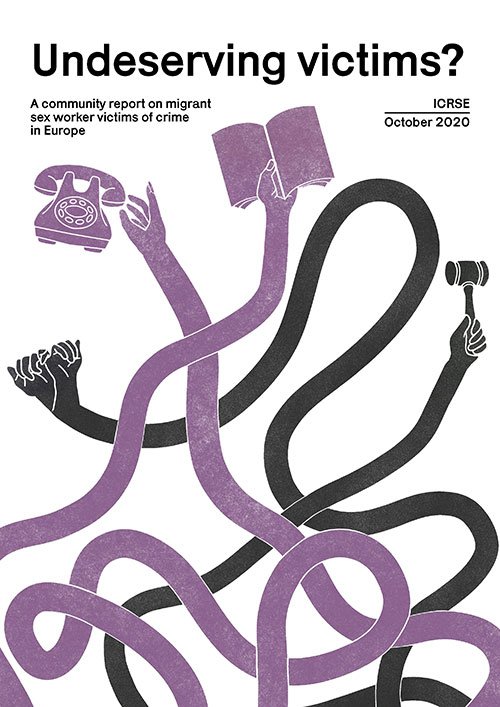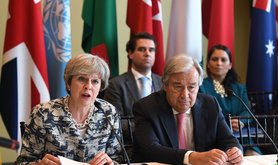
Missed opportunities and exclusion: sex workers reflect on two decades of anti-trafficking
The Palermo Protocol has targeted sex workers since day one, and whenever sex workers having spoken up against it since they have been systematically ignored. How is that ‘caring for the victims’?

PALERMO 20TH ANNIVERSARY SPECIAL
Are we better off on the inside?
Joel Quirk
Joanna Ewart-James
Nandita Sharma
Maria Grazia Giammarinaro
Mike Dottridge
International Committee on the Rights of Sex Workers in Europe
Cathy Feingold
Helga Konrad
Mika Leandro
Bandana Pattanaik
Helmut Sax
Sam Okyere
Marjan Wijers
For anyone interested in the rights of sex workers, the twentieth anniversary of the Palermo Protocol is an unmissable chance to evaluate how sex workers have been impacted by anti-trafficking rhetoric and policy. Whatever opportunities Palermo might have initially presented, it is now inextricably aligned with harmful ideological agendas that sex workers are obliged to resist and reject.
For decades now, sex workers in Europe have been combatting calls to ‘abolish prostitution’. These have gained prominence via the conflation of trafficking and sex work. Researchers have repeatedly demonstrated that this conflation is flawed, yet it continues to be championed by opponents of the ‘sex work is work’ approach.
At the heart of this dispute is the so-called Swedish Model. Born one year before the Palermo Protocol, this policy criminalises the clients of sex workers in order to end demand for sex work and, its proponents would believe, for trafficked women. Despite its many flaws, this model has now been adopted in Norway, Ireland, France, Northern Ireland, Israel, and Canada. Other countries are currently debating whether to adopt it as well.
Meanwhile, both the protocol’s and the Swedish Model’s overwhelming focus on criminal justice has channelled immense resources into the investigation and prosecution of traffickers, as well as into programmes designed to prohibit prostitution in all but name.
Criminalisation that harms
Despite political rhetoric framing anti-trafficking work as grounded in human rights, punitive approaches remain dominant. To a large extent, anti-trafficking has come to mean the criminalisation of users of services and goods produced by victims. Thanks to the blanket conflation of sex work and trafficking, combating trafficking for sexual exploitation has thus translated into criminalising the users (clients) of all sex workers.
The vulnerabilities brought on by the criminalisation of demand have been exacerbated by the criminalisation of facilitating sex work. This is often assumed to be a provision against abusive pimps, but under repressive prostitution and anti-trafficking regimes it goes much further. Any third-party facilitation of prostitution risks arrest and prosecution, and no distinction is drawn between abusive employers and groups of sex workers working together for safety. Thanks to laws such as FOSTA/SESTA in the United States, third party criminalisation has extended into the digital realm, with websites, applications, and online advertising platforms being shut down for facilitating prostitution and/or trafficking.
Sex workers are not welcome in anti-trafficking spaces, where a dogmatic approach to prostitution as a form of slavery prevails.
Much of this opposition to sex work has come from conservatives, who continue to understand sex in terms of purity and male control over women. However, the most visible champions of the conflation of sex work and trafficking have been radical feminists. Sometimes also described as ‘carceral feminists’, these individuals have made the criminalisation of the purchase of sex their central demand and rallying cry despite the harmful effects it brings to sex working communities.
To help make their case, these radical feminists have amplified the voices of some survivors of human trafficking. But they are highly selective. They don’t want to hear from survivors who demand a rights-based approach to migration and the decriminalisation of sex work. Individual stories of victims and villains must instead take centre stage, while politicians, activists, and the general public are allowed to play the self-gratifying role of saviours. Much less attention is paid to the context within which the crime of human trafficking takes place, or to the root causes and factors that exacerbate vulnerabilities extending far beyond the narrow focus of trafficking.
Sex workers are agents of change regarding issues affecting them!
So what choices do sex workers and sex worker organisations have if they want to address exploitation and vulnerability in the sex industry? Some collectives explicitly state that trafficking and modern slavery are unnecessary concepts that were forced onto the Global South by the Global North. Others try their best, despite a critical lack of funding, to leverage anti-trafficking spaces in order to amplify the voices of sex workers and to prevent harmful policymaking.
Since its inaugural European Conference on Sex Work, Human Rights, Labour and Migration in 2005, the International Committee on the Rights of Sex Workers in Europe (ICRSE) has always understood and conceptualised trafficking as a migration and labour rights issue. However, this has not translated into sustained engagement with anti-trafficking stakeholders and policymaking mechanisms. This is partly due to a lack of resources. But it also reflects a recognition that sex workers are not welcome in anti-trafficking spaces, where a dogmatic approach to prostitution as a form of slavery prevails. It’s exhausting and dispiriting to routinely enter into conversations where sex workers’ voices are ignored and misrepresented as ‘pro-trafficking’, or as a ‘disguise for pimps and traffickers’, so we have been careful about where and when we engage.
That said, over the last few years ICRSE and several of its members have increased their engagement with anti-trafficking policies and platforms, with various degrees of success. This is reflected in a recent collaborative partnership framework facilitated by ICRSE under the banner of ‘Rights not Rescue’. This framework seeks to add a fifth ‘P’ to the globally established ‘4 Ps’ approach. In addition to prevention, protection, prosecution, and partnership, we would add policies that don’t harm and don’t exacerbate vulnerabilities.
Despite widespread rhetoric regarding the need for victim-centred approaches to anti-trafficking interventions, the viewpoints and experiences of communities that are vulnerable to human trafficking are routinely ignored because they are regarded as politically inconvenient. This is chiefly because the most impacted communities comprise undocumented migrants and precarious and often informal sector workers, including sex workers. Sustained engagement with these groups would reveal that there are no easy solutions, such as punishing individual perpetrators. It would instead underscore the need to grapple with larger questions of security, migration, labour and social justice policies, and the design of economic systems.
Responses to the HIV/AIDS crisis point to a vastly more constructive model of engagement than the rescue, rehabilitation, and intensified policing associated with anti-trafficking.
Human trafficking and modern-day slavery have been sometimes described as global epidemics. This analogy isn’t very helpful, so let instead use a real pandemic: the HIV/AIDS crisis. As part of this crisis, sex working communities have been recognised as one of the key affected communities whose voices and experiences are crucial to formulating policy responses. International organisations and policy makers focusing upon HIV/AIDS tend to behave quite differently to their human trafficking counterparts. In the HIV/AIDS policy field, UNAIDS, WHO, UNFPA, and UNDP have called for the decriminalisation of sex work and elimination of unjust non-criminal laws and regulations against sex workers. They also recognise that violence against sex workers must be prevented and addressed in partnership with sex workers and their organisations, and that sex workers and their organisations should be meaningfully included in policymaking. And, finally and most importantly, they have found that, in the context of consensual adult sex and sex work, criminal laws actually cause harm, especially for already marginalised groups. Criminal sanctions against sex work contravene a number of human rights, including the right to equality before the law and equal protection of the law without discrimination; the right to be free from cruel, inhuman, or degrading treatment or punishment; and the rights to privacy and to health.
These responses to the HIV/AIDS crisis point to a vastly more constructive model of engagement than the rescue, rehabilitation, and intensified policing associated with anti-trafficking. As a rule, anti-trafficking victims are viewed as people who lack agency and who need to be rescued and rehabilitated. The meaningful inclusion of affected communities within anti-trafficking approaches would undercut this simplistic model, and enable a fundamental shift away from a narrow criminal justice approach and towards an economic and social justice approach grounded in migrant and worker rights.
Under this broader approach the criminalisation of migration and the sanctioning of undeclared workers would be recognised as barriers that exacerbate vulnerabilities. Undocumented migrants and informal workers, including sex workers, would be supported in their unionisation efforts. Sex workers and their organisations would be consulted and involved in anti-trafficking and anti-violence policies and interventions. Communities in vulnerable positions would be seen as agents of change, not agency-less subjects in need of rescue. Human and labour rights could be recognised and respected.
The danger of not making the cut as a ‘modern-day slave’
Around ten years ago there was a shift in the terminology: ‘modern-day slavery’ – an idea not embedded in international legislation – began to be used interchangeably with the legally defined crime of human trafficking. This shift had important effects. The modern-day slavery terminology intensifies the focus on exceptional cases of abuse and exploitation, which enables states to concentrate support and help on victims of the worst of the worst. People who are deemed to have ‘suffered less’ remain under the radar and fall through the cracks of an eroding social safety net. People who experience everyday abuse and exploitation are not regarded as modern-day slaves, and can therefore be detained, deported, or sanctioned for their undeclared labour or other migration- or prostitution-related offences.
This is illustrated by ICRSE’s latest community research, which was realised in partnership with twelve sex worker rights organisations from ten European countries. Our final report found that sex workers whose victimisation was classified as human trafficking were able to receive adequate support and referrals to services. Experiences that did not meet the threshold associated with human trafficking were more often than not greeted with indifference. In some cases filing a complaint resulted in threats of eviction or, in the case of migrant sex workers, deportation. We saw no evidence of cases of everyday abuse being referred to victim support services, despite high-level investment from European institutions in programmes to prevent violence against women and marginalised groups.
Sex workers and their organisations continue to challenge punitive anti-trafficking policy frameworks that target their workplaces and clients, rather than traffickers. Over the last twenty years, sex workers have not only had to combat the criminalisation of sex work, but have also endured global crises such as the 2008 financial crisis and the ongoing COVID-19 pandemic. They have also been faced with the erosion of human rights, shrinking civil society spaces, and volatile political environments.
Prostitution prohibitionists claim that trafficking increases in times of public crisis, but the reality is that poverty, precarity, and the need to cross borders to obtain a better life are the key factors leading people to sell sex. The post-COVID recession will be a crucial time to determine which approach is best suited to protect those most at risk in our society. Do we want a punitive approach that denies the root factors making people vulnerable to exploitation and trafficking? Or a community-led approach, where sex workers engage with policymakers and other marginalised communities to shape the decisions that will affect their lives?
This series has been financially supported by Humanity United.
Read more
Get our weekly email






Comments
We encourage anyone to comment, please consult the oD commenting guidelines if you have any questions.